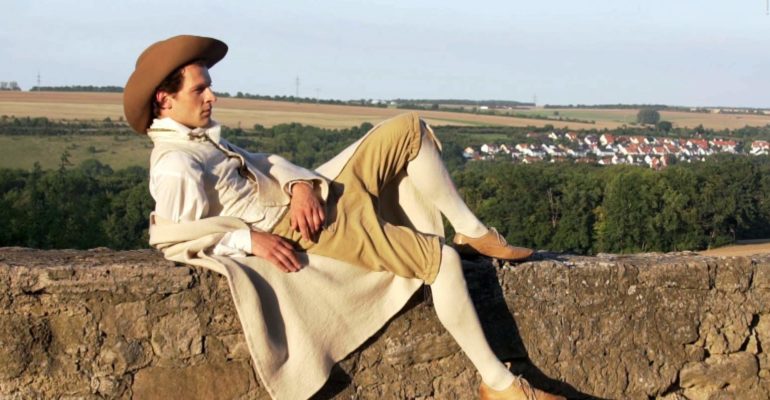Date/Time
Date(s) - 06/10/2020
7:00 pm - 9:00 pm
Categories
In our Monthly Film Series, we will show a variety of GERMAN or GERMAN language films from Germany, Austria and Switzerland. On the 2nd Wednesday of each month, audiences will now have a chance to see these films on a regular basis at the CLINTON STREET THEATER. (Children movies will be playing on Sunday afternoons – please check our website.) All films are with English subtitles.
Friendship of Men (Männerfreundschaften)
WEDNESDAY, June 10, 2020 – 7:00 PM
Director: Rosa von Praunheim
Cast: Matthias Luckey, Tobias Schormann, Thomas Linz, Sybille Enders, Willi Seibt, Sarina Radomski
What else beyond their shared affinity for literature may have bonded the two princes of poetry, Goethe and Schiller, who now look down upon their admirers in silent grandeur in front of the Deutsches Nationaltheater Weimar [Weimar National Theatre]?
In this cocky and insouciantly associative work, Rosa von Praunheim pursues then-contemporary pen pals like Wilhelm and Alexander von Humboldt, Kleist and Winckelmann to sketch out feverish correspondences, fabulate intimacies in sequences with actors, and savour historical speculation in interviews with experts.
Above all, Goethe’s erotic experiences on his famous journey to Italy play a particularly central role. In accordance to the director’s lusty thesis, unlike commonly believed, Goethe was not a heartbreaker and conqueror. It wasn’t until he went to Italy that he finally had diverse sexual experiences, not least with young men. The film bases this view on letters that Goethe wrote to his friend Friedrich Heinrich Jacobi in which he reported of his sexual experiences.
As in all his films, however, von Praunheim ultimately takes direct aim at the present day. This is particularly evident by his putting into perspective an uncivil exchange of intellectual and aesthetic blows from the 19th century: Heinrich Heine’s public accusations that August von Platen loved men has remained in the public memory to this day – no less so than von Platen’s massively anti-Semitic-flavoured attacks against Heine, at a time when public expressions of Jew-hatred were gaining increasing acceptance. Von Praunheim views the identified battlefield (homophobia vs. anti-Semitism) as an issue that is still of civil-society relevance today.
Anyone who is even the least familiar with Rosa von Praunheim’s work knows that the filmmaker loves to provoke. Goethe is basically the sacred cow of the German educated bourgeoisie, so one has to see it as almost inevitable that Rosa von Praunheim would one day also take a crack at that “creature”. With FRIENDSHIP OF MEN, the indefinite eventually becomes the precisely now, and in many conversations – inspired by Robert Tobin’s book, Warm Brothers: Queer Theory and the Age of Goethe – it apparently becomes clear to von Praunheim that playing intellectually with the homoeroticism of the 18th century has justification and contemporary relevance.
Even if no fundamental reinterpretation of all existing cultural and historical findings is undertaken, this film does aim to slightly skew the prevailing view of the great prince of poets and his epoch.
Rosa von Praunheim was born Holger Mischwitzky in 1942 in Riga, Latvia. He was raised in the GDR just outside of Berlin up until 1953, when he fled with his parents. After a few detours, the family settled in Frankfurt am Main in the district of Praunheim, where Mischwitzky attended a humanistic high school. Leaving school early, he then studied painting at the Offenbacher Werkkunstschule (today: Offenbach University of Art and Design [HfG]). After a year, he transferred to the Berlin University of the Arts. He ended his studies without graduating. At that time, the mid-1960s, he also adopted his artist name, Rosa von Praunheim, which he sees as a reference to the Frankfurt district of Praunheim, where he lived as a child, and the “Rosa Winkle” (“pink triangle”), the symbol used to by the Third Reich to identify homosexuals in the concentration camps.
In 1967, Rosa von Praunheim made his first film, a short entitled VON ROSA VON PRAUNHEIM [BY ROSA VON PRAUNHEIM]. His directorial debut was followed by further shorts and experimental films, including GROTESK – BURLESK – PITTORESK [GROTESQUE – BURLESQUE – PICTURESQUE] (1968) and SCHWESTERN DER REVOLUTION [SISTERS OF THE REVOLUTION] (1969). His first feature-length film, THE BED SAUSAGE (1970), quickly became considered a “cult film”. With his follow-up film, the documentary IT’S NOT THE HOMOSEXUAL WHO IS PERVERSE, BUT THE SOCIETY IN WHICH HE LIVES (1970), von Praunheim became, more or less overnight, an icon of the German gay rights movement, which also received a noticeable push by the movie. In the years that have followed, Rosa von Praunheim’s feature and documentary films have been characterised by three core motifs: the life journeys of lively, elderly women (e.g., OUR CORPSES STILL LIVE [1981]), homosexuality and Aids (e.g., A VIRUS KNOWS NO MORALS [1985]), and the city of New York (SURVIVAL IN NEW YORK [1989]).
To date, Rosa von Praunheim has directed over 70 films. More than 20 of them premiered at the Berlinale, making him the record holder. In addition to making films, since the 1960s Rosa von Praunheim has also been active as an author and has published books such as Sex und Karriere [Sex and Career], Armee der Liebenden oder Aufstand der Perversen [Army of Lovers, or Revolt of the Perverts], and Ein Penis stirbt immer zuletzt [A Penis Is Always the Last to Die]). From 2000 to 2006, he taught film direction at the Academy for Film and Television in Potsdam, and in 2009 he became a member of the Berlin Academy of Arts, section Film and Media Art; from 2015 to 2018, he was even the director of that section. In 2015, he added the German Federal Cross of Merit to his long list of awards.




